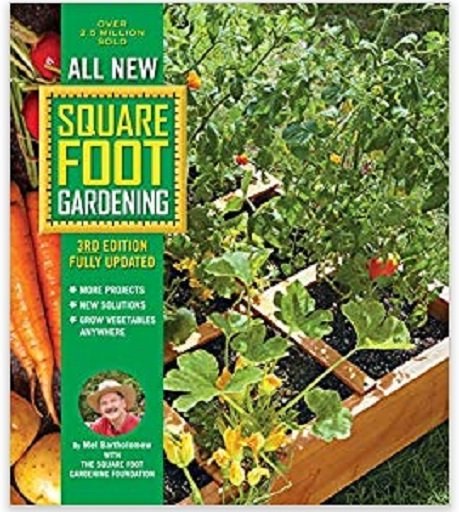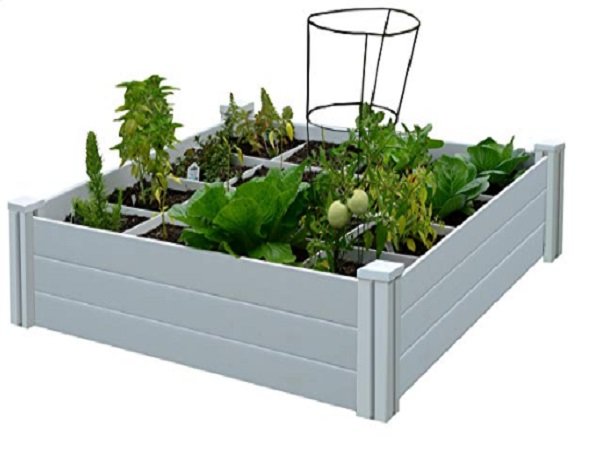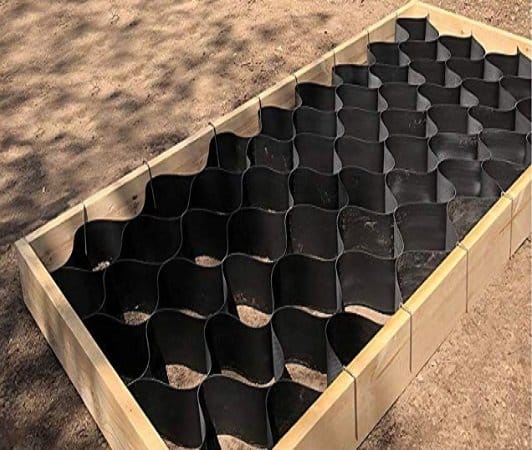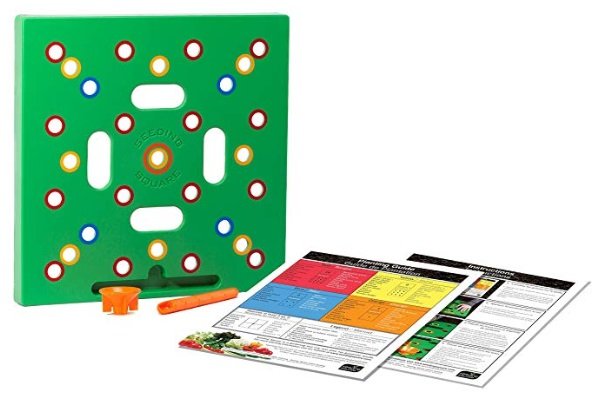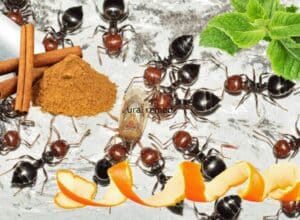Last Updated on October 18, 2023
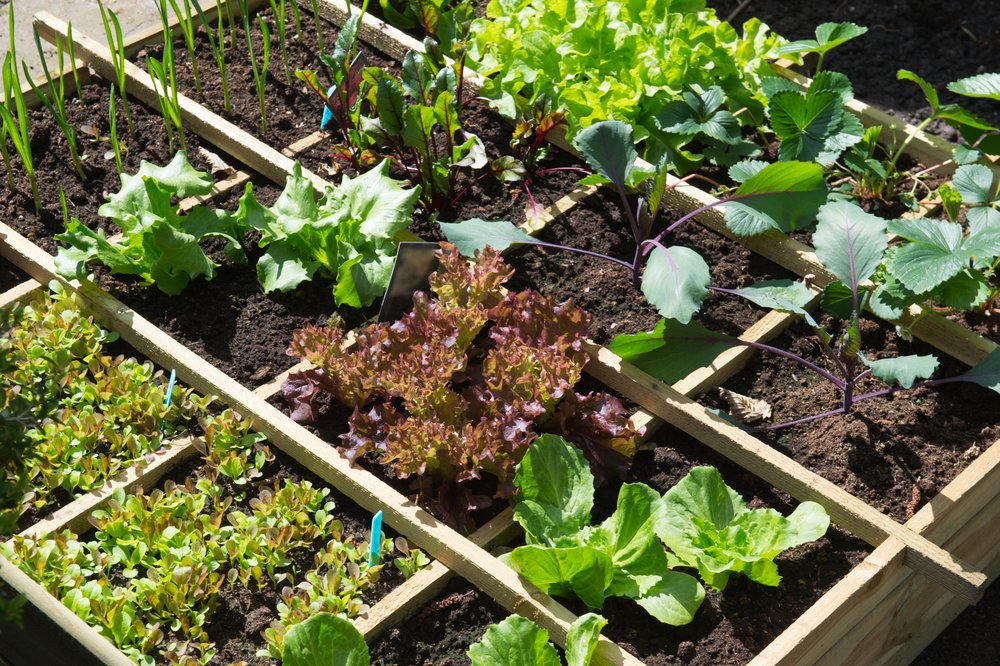
After reading this square foot gardening guide you will gain knowledge of what square foot gardening is about, and will be able to create your own square foot garden following step-by-step instructions
*This post contains affiliate links. If you choose to purchase any of the products I have recommended, I may receive a commission at no cost to you.
Let’s get started!
So, what is the square foot gardening method?
Short history of square foot gardening (SFG)
In 1980, Mel Bartholomew, a retired engineer and a newbie gardener, made an observation that just 20% of a traditional garden was dedicated to crops that were giving food, while the rest the space was taken by paths to walk between the rows. These paths had to be cultivated, so the weeds will not overgrow the plants. Also, the paths were watered and fertilized together with crops. In short, they were requiring resources, labour, and space while not giving anything in return.
This led Bartholomew to think of liquidating paths between rows, and sowing crops in a more efficient manner, so it can bring more food in smaller space with less required work.
As a result, a square foot gardening method was created by Mel which he described in his two books Square Foot Gardening (2005) and All New Square Foot Gardening (2013). If you’re going to get a book – buy the newer one.
All new Square Foot Gardening book
What does a square foot garden look like?
Based on New Square Foot Gardening book, a square foot garden is essentially a 4 feet x 4 feet raised garden bed that holds special growing medium mix to a depths of 6″.
The area in a garden bed is divided by a grid in 1 foot x 1 foot squares.
Each square has different plants sown (or transplanted) in it.
There can be 1, 4, 9, or 16 plants depending on their size in maturity in each square.
How is a square foot garden different from a traditional garden?
- plants grow in 1′ x 1′ square blocks, instead of rows
- you never walk on the soil
- the soil used in a bed is a mixture of vermiculite, peat moss, and compost.
What are the benefits of square foot gardening?
Because a square foot garden is built in a way that you never need to walk on soil, the only soil that needs to be cultivated, fertilized, and watered is the soil where plants grow, not in-between the rows.
This makes gardening more efficient.
According to Square Foot Gardening Foundation
the Square Foot Gardening method is estimated to
cost 50% less,
uses 20% less space,
10% of the water,
and only 2% of the work
compared to single row gardening.
Additional benefits are: virtually no weeds, no digging or rototilling, and no heavy tools are necessary.
The other advantages of square foot gardening:
- crop rotation can be done by squares, instead of location
- easy to implement succession planting ensures multiple harvests in small space
- trellis can be added to squares to grow plants vertically (peas, asparagus beans, cucumbers)
- makes gardening for seniors easier and more enjoyable.
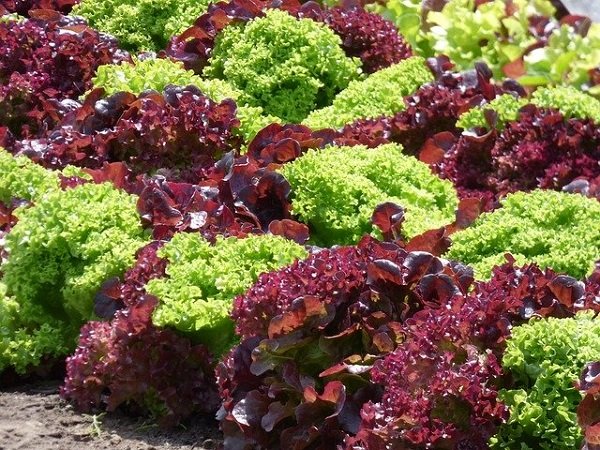
Planning and prepping a square foot garden
To plan an efficient square foot garden you’ll need:
- think of the space where your garden will go and how large will it be
- get supplies for creating a garden bed with a grid
- decide what to plant, how many and when.
1. Where will your garden go and how big should it be?
Choose your garden size depending on the available space and your needs, as well as the time you can dedicate to gardening.
The site where your garden will go should receive 6-8 hours of sun per day and have good drainage.
You can set it on grass or a paved area (on a patio or driveway).
The garden bed can be 4’x’4. 4’x6′ 4’x8′ or even 2’x2′ if available space is really tiny.
You should be able to reach your plants freely to tend your garden and divide it in 1×1 squares.
2. Get a garden bed ready
In essence, the square foot garden is a raised garden bed with a 1 foot square grid on top of it.
You can build a 4’x4′ box by yourself from untreated wood boards (cedar, pine) connected by raised garden corner brackets, cinder blocks, or bricks.
The box should be 7″ tall to accommodate 6 inches of growing medium or 12″ tall if you plan on planting rooted vegetables.
To make it easy on yourself, you can get a 4×4 Garden Bed with Grow Grid.
You can choose between two heights – 7 “ or 11 inches. If you plan to plant shallow-rooted crops like lettuce, and herbs – a 7” high garden bed will be sufficient. If you want to grow root vegetables – beets, carrots, potatoes – choose 11” height.
3. Place weed barrier
Line the bottom of the garden bed with weed-proof fabric.
Or you can place heavy cardboard which will suppress weeds and disintegrates over time.
4. Add Mel’s Mix™ or equivalent
Mel’s Mix™ is a growing medium specially created by Mel Bartholomew. It should be 6″ high for growing most vegetables, or 11″ high if you are growing rooted vegetables.
To create an equivalent resembling Mel’s Mix™, follow this recipe:
- ⅓ (by volume) coarse grade vermiculite
- 1/3 (by volume) sphagnum peat moss (or coconut coir)
- 1/3 (by volume) blended organic compost. You can buy it or make your own from food scraps.
5. Divide garden bed area by 1′ x 1′ grid
The grid lets you clearly see how to space your seeds or plants. It also makes your garden look neat and organized.
You can make your own grid from 1″ wide planks from a hardware store or by using twine (see instructions in a “useful tip” box below).
Alternatively, you can purchase a ready made garden bed with square foot grid.
Another interesting idea is to use Garden PODS grid which is made of a food-grade high-density polyethylene (HDPE).
The manufacturer states that having full separation allows you to have different growing conditions (for example – different soil, pH) that will suit the needs of different plants all in one bed.
GardenPODS grid for garden beds
Useful Tip
How to convert any raised bed to a square foot garden
If you already have a raised bed or large rectangular or square planter, it is quite easy to adapt it to square garden.
1. Take round head wood screws (the chosen screws’ length will depend on the thickness of your raised bed board.
2. Screw them on the sides of raised garden bed board at a distance of 1 foot from each other starting from the edge.
Do not sink the screws into the boards fully. Leave ⅛ of distance.
3. Use garden twine tied around screws’ heads to make a square grid.
6. Use vertical space
Consider adding trellis to the north side of squares (in order not to block the sun). This way you can grow peas, melons, pole beans or asparagus beans.
Planting a square foot garden
Each square in square foot garden holds different crops.
There can be 1, 4, 9, or 16 seeds or seedlings planted in each square.
Square foot garden spacing: how many plants can you plant in a square foot garden?
Square foot garden spacing guide
You can plant in 1’x1′ square:
1 potato, tomato, pepper, eggplant, cabbage, broccoli, kale, cauliflower, melon (on trellis) cucumber (on trellis) summer squash (on trellis)
4 leaf lettuce, chard, kohlrabi, basil, parsley, strawberries (cut the runners when they appear), sorrel,endive, radicchio, celery
9 beets, turnips, bulb onion, garlic, spinach, arugula, dill, cilantro, chives, peas, bok choy
16 carrots, radishes, green onions, mesclun mix
How to calculate how many seeds to plant in one square
If you do not see a crop in the above list, look at seed package of the plant you want to grow.
Usually on the package you will find information about row and seed spacing.
Ignore information about row spacing and note the guidance for seed spacing.
For example, it is written on the package – 3” for seed spacing. Since each square is 12’’ long, 12″/3″= 4 seeds, and because the square is 12” wide 12″/3″= 4 seeds. 4×4=16 (4 seeds long by 4 seeds wide). This means that you can plant 16 seeds in one square if the indicated seed spacing is 3’’.
If the plant requires more than 12″ of seed spacing, you’ll just plant one plant in the center of the square.
Seeding Square – a square garden sowing helper
To make sowing seeds in square foot garden easier, use Seeding Square – a color coded seed spacer.
The package includes Spacing Square with color-coded holes, seed dibbler with depth marking, seed spoon, funnel, and a color-coded template which contains information about the spacing of different plants.
This gadget ensures that you sow seeds at just the right distance.
All that you need to do is press the seed square into the soil, poke the color coded holes that match the code of the plant you are sowing, and plant your seeds.
Related reading:
Square Foot Garden succession planting: multiple harvests in small space
It is easy to utilize succession planting with square foot garden.
For example, you like lots of lettuce, green onion, and radishes for steady salad supply from early spring to early summer. Use 4 squares for each crop and sow lettuce and radish seeds/plant onion sets each week in the next square. This way your crop will mature at different times.
After you harvest lettuce/radish/green onion, you can plant tomato, eggplant, or pepper plants in the square. And after you harvested tomatoes and peppers in the late summer – plant lettuce-radishes-green onions again to harvest them in early autumn. See?🙂
Related reading:
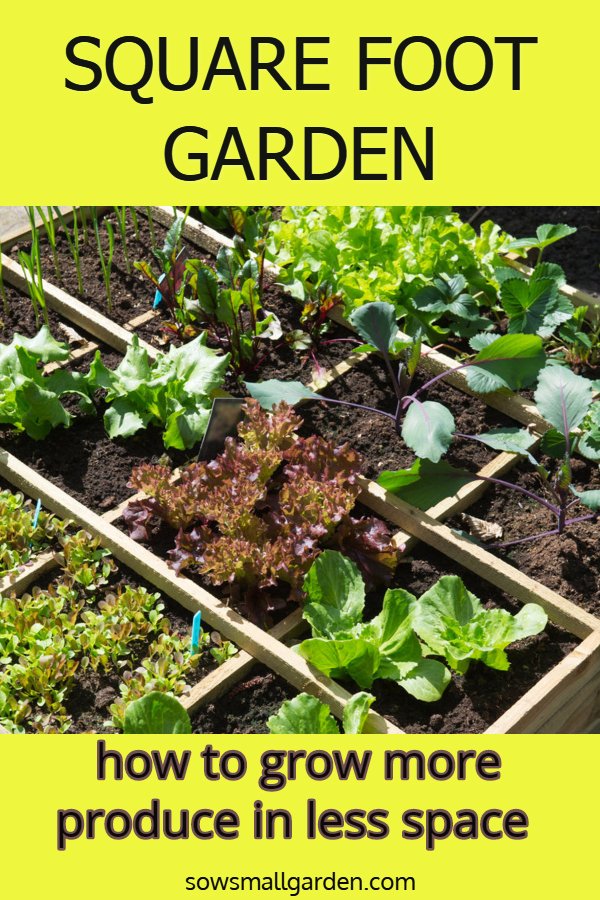
Final thoughts on square foot gardening
If you are a beginner gardener or have limited space for a garden, try square foot gardening by following this step-by-step square foot gardening guide. Square foot gardening will save you time, resources, and effort and result in a larger harvest from a small space which will bring a higher level of satisfaction to your gardening endeavor.
Happy gardening!👩🏽🌾
If you found this article useful – be so kind as to share it with friends.
You have read:


